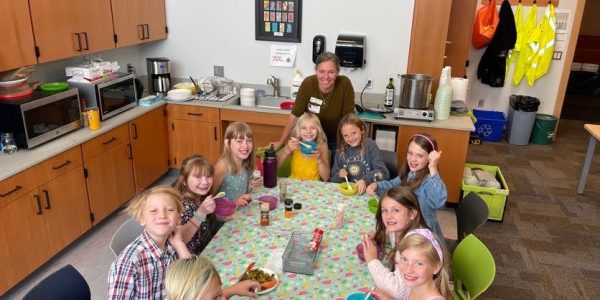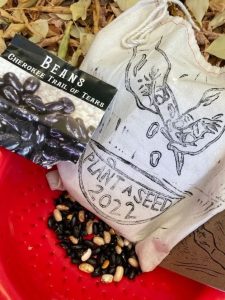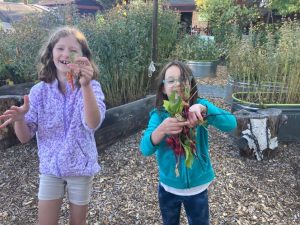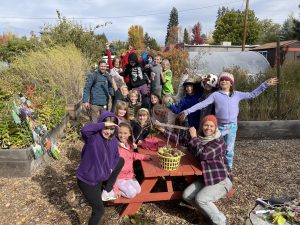Stories from the Garden: Fall 2022

Although the garden is currently under a blanket of snow, Denise and Adrienne (along with volunteers, parents, teachers, and students) had plenty of great garden shenanigans this fall! Read on to learn about and share our gratitude for the small moments that make our garden programs so special:
Three Sisters Garden Bed
The winter squash didn’t get pollinated until late August. The corn was started too late and got strangled by the beans. The three sisters soup we planned when we planted corn, beans and squash never did materialize, but ask any kid about how those 3 plants help each other out, and they will probably still be able to tell you. In small teams this past spring, before we planted the Three Sisters Garden, the 3rd graders learned about this indigenous planting strategy and acted out a quick skit by role playing each plant. What ensued were short, funny little skits they acted out with their bodies mimicking the tall trellis of sister corn, the sister beans climbing up them and enriching their soil with nitrogen, or sister squash, conserving water down below in the soil with her wide shady leaves.
Slow Food: Plant A Seed Kit

In a Learning Garden, the harvesting of food is almost an extra bonus. While a lot of things actually did not do so well this year (green tomatoes in the greenhouse in October!) we did do pretty well growing beans. In addition to our Dragon Tongue beans we planted in the Three Sisters garden bed, we had 6 new beans to plant throughout the garden from the Slow Foods Plant A Seed Kit. In the kit, free to school gardens every year, they included a bean zine giving some background on each bean, representing a different region of the United States. In small groups, students read the background of their bean, and with only a few minutes of preparation, they shared with the class information on their bean and made their case of why we should choose to plant that one. After we heard from each group, each student voted (using a bean, duh) and the clear winner was the Cherokee Trail of Tears Black Bean, from the Southeast. From the seed packet:
“In 1839, the US federal government forcibly removed the Cherokee people from the Great Smoky Mountains to Oklahoma. Many people died and suffered on this “Trail of Tears,” but they carried this bean.”
We discussed what that meant, and the resilience of people to have the fortitude to carry seed, food, nourishment, along on this death march. This resilient bean that had been through so much was the clear winner among students to plant that day.
Garden Harvest Bean & Potato Soup

Fast forward to fall, when the 4th graders returned to the garden to see what they could harvest for the soup. With gratitude, there were plenty of beans and hidden potatoes. Back at the school the following week, in small groups the students shelled beans, chopped potatoes, and minced a tiny onion, overgrown garlic, and a few tiny carrots. We added some veggie broth and just when the soup was ready…itwas time for half their class to take their school pictures! Quick pivot from everyone enjoying soup in the classroom turned into half the class sitting around the table in the staff room…and suddenly the talk was of the soup! How they were each seasoning it, how many helpings they had, how delicious it was! It was positive peer pressure focused on the soup, and we will probably have the meal like that all the time in the future. All students left with a packet of the delicious dried Cherokee Train of Tears black beans to plant next year for their own soup.
Soil Your Undies Challenge

For their final garden visit, the Amity 4th graders helped prepare the garden beds for winter. But not before digging up the white cotton underwear they buried last spring! As part of the Soil Your Undies Challenge, (which we shared with our Garden Educator Network last fall) we buried a pair of underwear (cut in half, in 2 spots) to test out how fertile and active our soil was. The students made predictions about what they would find, and we were thrilled when one group found an elastic band and threads hanging off. It was highly anticipated, and we will never NOT bury underwear in the garden in the future.
Cooking Skills at M.A. Lynch
For our FoodCorps Service Member Adrienne, working for a 2nd service year at Lynch Elementary School in Redmond, there were many garden highlights from a busy fall. Garden Club reconvened for 4 weeks, including many of the same students who attended Garden Club in the Spring, great for learning about the whole growing season! Some highlights include digging up underwear and making it into a scientific process (making hypothesis then talking about results), as well as harvesting herbs to make herb butters, then adding it to roasted potatoes from the garden for a garden snack.
Garden Club students weren’t the only ones learning cooking skills however. 5th grade classes also got to learn some food preparation skills making a pico de gallo salsa in the garden using garden tomatoes, and harvesting their cabbage to make coleslaw back in the classroom. 4th graders learned about fry bread, then made it and enjoyed it in class. One of her students reported that she went home and made fry bread again with her family that very night. Whether is working with the students in the classroom, the garden or delivering the weekly Snacky Wacky Wednesday tasting, when Adrienne meets parents at events, most of the time they have already heard of what she’s doing at the school from the stories kids are bringing home from school.
Garden Grants

While snow may be blanketing the frozen ground, we know teachers are busy dreaming up improvements to their school gardens. We had 19 school garden grant applications from all over Central Oregon, requesting over $27,000 is funding. Educators are excited to get their students outside experiencing science, applying math, learning history, connecting geography, practicing life skills and so much more in a garden classroom. Stay tuned for a January announcement to hear about all the great projects local educators are planning for spring in their school garden classrooms.